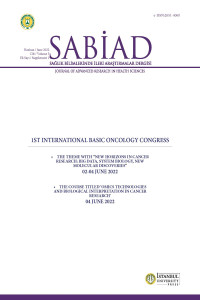Abstract
Diet influence human health in different ways. But it is well known that diet can adversely affect various human pathologies, like obesity, diabetes, hypertension, and cancer. The relationship between diet, obesity and cancer has been studied for different types of cancer such as breast, colorectal and gastric cancers. High fat diet induced obesity is an established risk factor for cancer in many tissues. In the mammalian intestine, tumorigenesis is facilitated by a pro-obesity high-fat diet (HFD) by enhancing PPAR (peroxisome proliferator-activated receptor) nuclear receptor activation. PPARs induced fatty acid oxidation increased stem cell number and tumorigenesis. The rate controlling enzyme of fatty acid oxidation, CPT1A, dampens the pro-tumorigenic phenotype by blunting HFD effect in ISCs. High-fat ketogenic diet also elevates ISC function and regeneration capacity through βOHB-mediated Notch signaling, but a glucose-supplemented diet has the opposite effects. High glucose diet also presents an indirect link between sugar and cancer. The relationship dietary supplements used in addition to the diet and cancer is frequently studied. In literature, there is strong evidence on the anticancer effects of anthocyanins, curcumin, vitamin D, and their mechanisms.
Keywords
References
- Wellek S, Blettner M. On the proper use of the crossover design in clinical trials: part 18 of a series on evaluation of scientific publications. Dtsch Arztebl Int. 2012;109(15):276-81
Abstract
Diet influence human health in different ways. But it is well known that diet can adversely affect various human pathologies, like obesity, diabetes,
hypertension, and cancer. The relationship between diet, obesity and cancer has been studied for different types of cancer such as breast, colorectal and
gastric cancers. High fat diet induced obesity is an established risk factor for cancer in many tissues. In the mammalian intestine, tumorigenesis is facilitated
by a pro-obesity high-fat diet (HFD) by enhancing PPAR (peroxisome proliferator-activated receptor) nuclear receptor activation. PPARs induced fatty acid
oxidation increased stem cell number and tumorigenesis. The rate controlling enzyme of fatty acid oxidation, CPT1A, dampens the pro-tumorigenic
phenotype by blunting HFD effect in ISCs. High-fat ketogenic diet also elevates ISC function and regeneration capacity through βOHB-mediated Notch
signaling, but a glucose-supplemented diet has the opposite effects. High glucose diet also presents an indirect link between sugar and cancer. The
relationship dietary supplements used in addition to the diet and cancer is frequently studied. In literature, there is strong evidence on the anticancer
effects of anthocyanins, curcumin, vitamin D, and their mechanisms.
Keywords
References
- Wellek S, Blettner M. On the proper use of the crossover design in clinical trials: part 18 of a series on evaluation of scientific publications. Dtsch Arztebl Int. 2012;109(15):276-81
Details
| Primary Language | English |
|---|---|
| Subjects | Clinical Sciences |
| Journal Section | Meeting Abstract |
| Authors | |
| Publication Date | August 9, 2022 |
| Submission Date | June 25, 2022 |
| Published in Issue | Year 2022 Volume: 5 Issue: S-1 |


